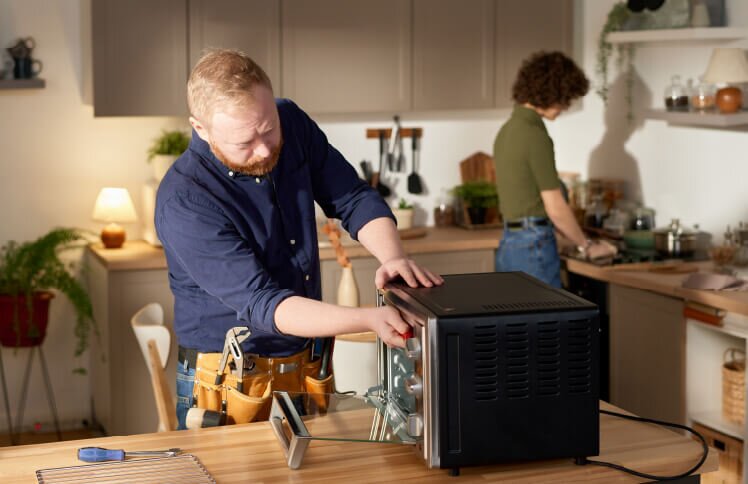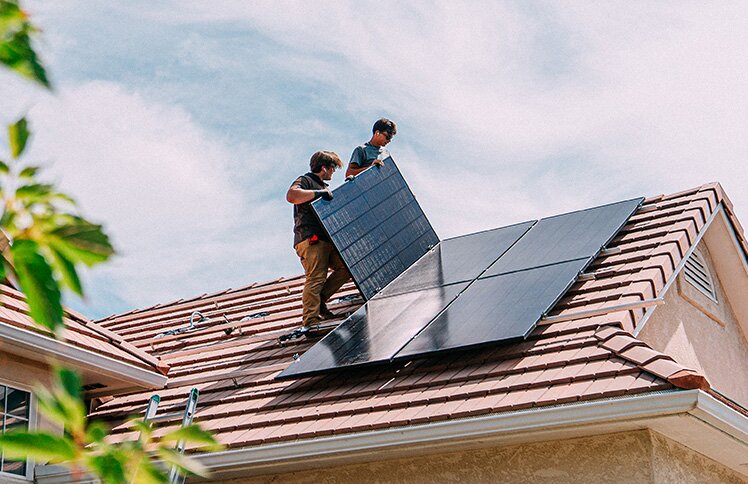Confronting Home Repair Scams: Experts Weigh In on How To Protect Yourself

While a sudden home repair emergency can be a crisis to homeowners, bad actors see it as an opportunity. In 2024, the Federal Trade Commission (FTC) received 81,925 reports of home improvement scams. These come at a high price to homeowners. According to the Better Business Bureau (BBB), each scam costs homeowners an average of $1,800.
The tactics scammers use can be surprisingly sophisticated, exploiting homeowners' fears about safety. Clay Hamilton, President of Grounded Solutions, describes one particularly troubling example:
"The most insidious scam I encounter involves contractors offering 'free electrical inspections' after storms, then claiming your entire panel needs immediate replacement for $8,000-$12,000.
"Last month, a homeowner called us after one of these operators demanded $6,500 up front to 'prevent a house fire by tomorrow.' Our actual inspection revealed [that] only a $200 GFCI outlet replacement was needed."
Home improvement scams try to strike when homeowners are stressed and need immediate repairs, but they can happen anytime and to anyone. Protecting your home and finances starts with understanding common scam tactics, knowing your homeowner's insurance details, and learning what to do if you’re faced with contractor fraud.
6 common types of home repair scams
- Solicitation after extreme weather events: In 2023, the U.S. saw $9.3 billion in losses due to post-disaster fraud. These scammers, often called storm chasers, pressure vulnerable homeowners into immediate repairs, resulting in low-quality or unfinished work.
- Garage door scams: The BBB reports that garage door contractor scams are surprisingly common. These often involve contractors claiming a sudden need for repair or replacement, pressuring homeowners into expensive, unnecessary services.
- Offering free solar panels: Scammers lure homeowners with promises of no-cost solar installations, touting government programs or energy savings. According to the BBB, these schemes often have hidden fees, predatory loan agreements, or inflated long-term contracts.
- New driveway or asphalt scams: Unsolicited contractors offer to pave driveways or seal asphalt with leftover materials at a steep discount. They push for immediate cash payments and do poor-quality work that quickly falls apart. Some victims have lost more than $8,000 to this type of scam.
- Providing free inspections: Someone offers a free inspection, usually claiming to notice an issue from the street. These scammers might invent or exaggerate problems to pressure homeowners into unnecessary or overpriced repairs.
- Snowballing home improvement projects: This scam starts with a seemingly small, legitimate repair, but the contractor then claims to find more problems that increase the project scope and cost. Homeowners can find themselves stuck in a cycle of escalating costs for work.
Home repair scam red flags to watch out for
- No local business address or phone number: Legitimate contractors usually have an established local presence and a verifiable contact number. Be wary if they only provide a cell phone number or seem to operate without a fixed base.
- Requests for full payment up front: A reputable contractor will typically ask for a reasonable down payment, but most won't demand the full cost before work begins. This is a major warning sign that they might take your money and disappear.
- Refuses to provide written estimates: Ask for a detailed, written estimate that breaks down all costs, materials, and the scope of work. A contractor who avoids putting things in writing could be hiding something or leaving room for hidden fees.
- No proper licensing or insurance: Check with your state's contractor licensing agency, like the Department of Consumer Affairs, to make sure the contractor is licensed and insured for the work they'll be doing. Licensing helps protect homeowners from unqualified work, while insurance protects you from liability if a worker gets injured or your property is damaged during the project.
- High-pressure sales tactics: Be cautious of contractors who pressure you into making an immediate decision, especially by claiming limited-time offers or urgent dangers. Legitimate professionals give you time to consider your options.
- Significantly lower bids than competitors: While a good deal is always welcome, a bid that's drastically lower than others should raise a red flag. It could mean the contractor plans to use low-quality materials, cut corners on labor, or inflate costs later by claiming they’ve run into unforeseen issues.
How to spot fake specialists
SPECIALTIES | QUESTION | ANSWER |
|---|---|---|
Roofing | What's the recommended ice dam barrier width for our local climate zone? | The ice dam barrier should extend 24" beyond the interior wall line. |
HVAC | What size unit do we need based on our home's square footage and insulation levels? | Basic rule: multiply square footage by 20 BTUs. Older homes may need 30-35 BTUs per square foot. |
Electrical | Does our electrical panel have enough amperage capacity for the addition we're planning? | Depends on multiple factors (like local codes, home square footage, etc.), but the load on the panel shouldn’t exceed 80% of its capacity. |
Plumbing | What's the standard slope requirement for horizontal drain pipes like ours? | Standard drain pipe slope is ¼ inch per foot for proper drainage. |
Questions to ask before hiring a contractor
- Can you give local references from recent jobs?
- What licenses and insurance do you have?
- Will you give a detailed written estimate?
- What’s your timeline for completing this project?
- How do you handle change orders and additional costs?
- What warranty do you offer on your work?
- When asking these questions, listen to how the contractor responds.
- Evasiveness or unclear answers: A legitimate contractor should be able to answer questions about their experience, licensing, insurance, and the project details. If they avoid direct answers, change the subject, or can’t give specific details, they could be hiding something.
- Aggression or defensiveness: If a contractor gets angry, defensive, or dismissive when you ask questions, they might be trying to intimidate you or cover up their lack of credentials.
- Lack of transparency: Are they unwilling to put everything in writing? Do they seem reluctant to let you see previous work or speak to past clients? A trustworthy contractor will be open and transparent about their business and the project.
Verifying contractor credentials and insurance coverage
- Check the state licensing database: Verify a contractor's license through your state's licensing board or the National Conference of State Legislatures (NCSL). This helps confirm they're qualified, guarding against unlicensed individuals.
- Verify insurance coverage: Request proof of insurance in the form of a Certificate of Insurance from your contractor. Look for general liability and workers’ compensation policies.
- Review Better Business Bureau ratings: Review the contractor's BBB profile. This can offer valuable insights into their reliability and dispute handling.
- Confirm business registration: Confirm the contractor's business is formally registered with your state's Secretary of State or equivalent registry. This verifies their legal operating status.
Decoding home repair contracts
- Detailed scope of work: A clear, exhaustive description of all the work being done, leaving no room for ambiguity.
- Materials specifications and costs: Specific details about the quality, brand, and type of materials, along with their exact costs.
- Timeline and payment schedule: A defined start and end date for the project, along with a clear schedule of payments tied to project milestones, not just arbitrary dates.
- Warranty information: Details on what aspects of the work or materials are covered by a warranty, for how long, and how to file a claim if an issue arises.
- Change order procedures: A clear process for how any changes to the original plan, scope, timeline, or cost will be formally documented and approved by both parties.
- Lien waiver provisions: Language that states the contractor and any subcontractors or suppliers will waive their right to place a lien on your property once you've paid them for their work.
Important note: Hippo Insurance Services does not provide legal advice or counseling. This checklist is for informational purposes only and does not constitute legal advice. For guidance on specific contracts or legal issues, consult a qualified legal professional.
What to do if you're a victim of a home repair scam
- Document all communications and payments: Gather every piece of evidence, including contracts, invoices, receipts, emails, text messages, photos of the work, and notes from conversations.
- Contact your bank or credit card company: If you paid by credit card or bank transfer, immediately contact your financial institution to report the fraudulent charges and inquire about disputing them.
- Report to local law enforcement: File a police report. While law enforcement may not always pursue individual cases immediately, having an official report could help with other legal and financial actions.
- File complaints with state consumer protection agencies: Reach out to your state's Attorney General's office or Department of Consumer Affairs. These agencies often investigate consumer complaints and could help guide you on what to do next. This resource could help you get started.
- Report to the Better Business Bureau: File a complaint to create a public record of the scam. This also allows the BBB to try to mediate a resolution.
- Contact your insurance provider: Tell your homeowners insurance provider about the situation. They may be able to offer guidance, especially if the scam involves damages or incomplete work that might impact potential future claims or your coverage.
Important note: Hippo Insurance Services does not provide legal advice or counseling. If you believe you’ve been victimized by a home repair scam, promptly contact the appropriate authorities and professionals for assistance.
Protect your domain with Hippo
Related Articles

Home Appliance Maintenance Tips To Help You Avoid Summer Meltdowns

When Is the Best Time To Buy a House? Expert Tips for Homebuyers

Avoid Costly Insurance Claims: Grilling Accidents Cause Nearly 10,000 Fires Annually

Hippo Resilience Report: Best States for Climate Change

2025 Dream Home Must-Haves: Practical, Flexible, and Built to Last

